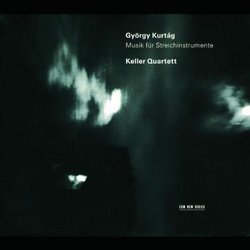| All Artists: Gyorgy Kurtag, Keller Quartet Title: György Kurtág: Music for String Instruments Members Wishing: 0 Total Copies: 0 Label: ECM Records Release Date: 2/1/2000 Genres: Special Interest, Soundtracks, Classical Styles: Chamber Music, Historical Periods, Classical (c.1770-1830) Number of Discs: 1 SwapaCD Credits: 1 Other Editions: György Kurtág: Musik für Streichinstrumente (Music for Strings) - Keller Quartet UPC: 028945325828 |
Search - Gyorgy Kurtag, Keller Quartet :: György Kurtág: Music for String Instruments
 | Gyorgy Kurtag, Keller Quartet György Kurtág: Music for String Instruments Genres: Special Interest, Soundtracks, Classical
|
Larger Image |
CD Details |
CD ReviewsNew Music which Dares to make an Impact C. Noble | Portland, OR USA | 01/11/2001 (5 out of 5 stars) "As a member of a professional string quartet, I'm always on the lookout for new repertoire for my group to perform. I'd noticed that several Kurtag pieces had been performed (by the Emerson and Orion quartets, most recently) and wanted to see what all the buzz was about. Turns out, it was worth the purchase of this fine CD. I've always been a fan of Webern and Ligeti, and Kurtag seems to me to embody the best of these two composers' styles, while remaining very much his own distinct musical personality. The Keller Quartet plays these pieces with great virtuosity, but not at the expense of passion and what I can only describe as a "avant garde bel canto". If you have any interest in new music, and especially new music which is extraordinary, look no further than this disc." Dark, rich and splendid! R. Hutchinson | a world ruled by fossil fuels and fossil minds | 07/27/2001 (5 out of 5 stars) "This is an exquisite recording of some of the best in modern music. The three major pieces are Kurtag's String Quartet (op. 1) of 1959, the second quartet, 12 Microludes (op. 13), of 1977-78, and the third quartet, Officium Breve (op. 28) of 1988-89. Three shorter pieces are included as well, including two versions of Ligatura, with Kurtag on celesta. Kurtag clearly fuses Webern and Bartok, producing dark, rich music that is never exhausted through repeated listening. How does this 1996 KQ/ECM recording compare to the 1990 recording by the Arditti Quartet of Kurtag's three string quartets on Montaigne, supervised by Kurtag? (see my review) The KQ takes the tempos slightly slower, and this produces a suitably dramatic effect. The tempo difference is likely one chief cause of the difference in affect -- the AQ sounds more anguished overall, whereas the KQ is slightly more restrained, more stoic. Of course the KQ is treated to Manfred Eicher's patented production, with its noticeable resonance, and this produces a darker tone, it seems. The Montaigne production of the AQ is more natural, with a clean, clear surface. The KQ adds three short Kurtag pieces for an all-Kurtag set, while the AQ adds Lutoslawski's 25-minute quartet (his only one), and the 10-minute Second Quartet by Gubaidulina. ECM's graphics and packaging are stunning, as usual, with black-and-white photography. It is fascinating to hear the alternative interpretations, and Kurtag's works certainly warrant more! But if you hear only one, the Keller Quartet's recording is outstanding." Exquisite music,refined structures of minimal emotive means R. Hutchinson | 07/29/1999 (5 out of 5 stars) "This music reflects a dark aesthetic,Kurtag moved to Switzerland but acquired Hungarian citizenship. He studied in Messiaen's famous class on analysis in the late Fifties,one of the first Hungarians to do so.He felt he had a language inside him, one of musical focus and contraction until he heard the music of Ligeti and Stockhausen's "Gruppen" for three orchestras. His music however is steeped in the European sensibility for structure and a profound dimension without the pretencious accoutrements that usually attach to that worldview. He writes for strings like they are his Mother tongue,like his own children's voices.Here in "Aus der Ferne III" are sparse,exposed, understated statements in the first violin.The genre of the string quartet has always been reserved for introspection,for a private moment,nothing social, or abundant. The "12 Microludes" requires a structural refinement of the imagination,and push the lever of this time-honed genre. If preludes are one idea pieces, then microludes are in the negative realm,left of the number one integer. The plan is,should be extreme contrast, nothing, no musical moment should give itself toward structural cohesion from piece to piece. But here Kurtag's music betrays him, there is coherance at times. The economy of means here is always a player, an element in his music. Kurtag understands the diamond shaped fragments of Anton Webern. But oddly Kurtag seems to be more social in his miniature pronouncements,more with an affinity for some leftover human dialogue as from a coffee bar,as if one is still necessary in order for music to preserve itself.It is a music not of exile,as many might believe,but one of an engaged aesthetic commenting on the human condition,even if a private,self-referential one. The Keller Quartett deploy themselves admirably,they have committment to their playing,impassioned yet tempered by the understatements of this music,not afraid of exposing their emotional constitution,unlike Arditti where such indulgences are frowned upon."
|

 Track Listings (22) - Disc #1
Track Listings (22) - Disc #1